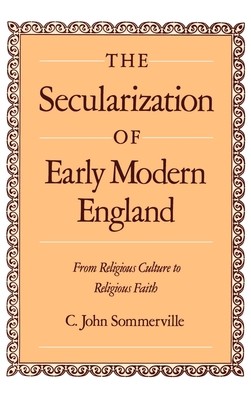
- We will send in 10–14 business days.
- Author: C John Sommerville
- Publisher: Oxford University Press, USA
- ISBN-10: 0195074270
- ISBN-13: 9780195074277
- Format: 16.4 x 24.4 x 2.3 cm, kieti viršeliai
- Language: English
- SAVE -10% with code: EXTRA
Reviews
Description
This study overcomes the ambiguity and daunting scale of the subject of secularization by using the insights of anthropology and sociology, and by examining an earlier period than usually considered. Concentrating not only on a decline of religious belief, which is the last aspect of secularization, this study shows that a transformation of England's cultural grammar had to precede that loosening of belief, and that this was largely accomplished between 1500 and 1700. Only when definitions of space and time changed and language and technology were transformed (as well as art and play) could a secular world-view be sustained. As aspects of daily life became divorced from religious values and controls, religious culture was supplanted by religious faith, a reasoned, rather than an unquestioned, belief in the supernatural. Sommerville shows that this process was more political and theological than economic or social.
EXTRA 10 % discount with code: EXTRA
The promotion ends in 22d.18:26:33
The discount code is valid when purchasing from 10 €. Discounts do not stack.
- Author: C John Sommerville
- Publisher: Oxford University Press, USA
- ISBN-10: 0195074270
- ISBN-13: 9780195074277
- Format: 16.4 x 24.4 x 2.3 cm, kieti viršeliai
- Language: English English
This study overcomes the ambiguity and daunting scale of the subject of secularization by using the insights of anthropology and sociology, and by examining an earlier period than usually considered. Concentrating not only on a decline of religious belief, which is the last aspect of secularization, this study shows that a transformation of England's cultural grammar had to precede that loosening of belief, and that this was largely accomplished between 1500 and 1700. Only when definitions of space and time changed and language and technology were transformed (as well as art and play) could a secular world-view be sustained. As aspects of daily life became divorced from religious values and controls, religious culture was supplanted by religious faith, a reasoned, rather than an unquestioned, belief in the supernatural. Sommerville shows that this process was more political and theological than economic or social.


Reviews